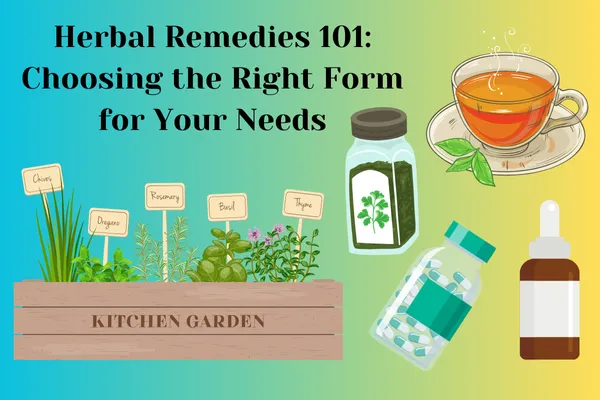
Herbal Remedies 101: Choosing the Right Form for Your Needs
Herbal Remedies 101: Choosing the Right Form for Your Needs
As an herbalist, one of the most frequent questions I get is about the different forms of herbs: What’s the difference between tinctures, dried herbs, capsules, teas, and fresh herbs? Each form has unique benefits, and choosing the right one depends on your lifestyle, health goals, and personal preferences.
Here’s my breakdown of each type, along with why tinctures often top my list.
Fresh Herbs: For Those Who Want to Go Right to the Source

Using fresh herbs is as close as you can get to the plant in its natural state. I love fresh herbs in my own kitchen—they’re vibrant and full of life, and their flavors are unbeatable in culinary recipes. However, when it comes to getting consistent medicinal benefits, fresh herbs can be tricky. They often contain lower concentrations of active compounds than dried herbs or tinctures. Plus, fresh herbs don’t have a long shelf life, so they’re best for short-term, everyday use.
Fresh herbs are ideal for cooking or for infusions when the plant is in season, but if you’re looking for long-lasting herbal support, other forms may be better suited to your needs.
Dried Herbs: Versatile and Great for Teas or Capsules

Dried herbs are another staple in my herbal toolkit. When herbs are dried properly, they can retain much of their potency and last for several months to even years. They’re also versatile—you can use them to make teas, add them to soups, or even grind them up for DIY capsules.
One downside of dried herbs is that they require a bit of preparation to use medicinally. They’re also less concentrated than tinctures or extracts, meaning you may need to use more to get the same level of benefits. However, for people who enjoy the ritual of making tea or blending their own remedies, dried herbs are wonderful and budget-friendly.
Capsules: Convenience in a Bottle

For clients who need convenience, capsules are often my recommendation. They’re simple, easy to take, and ideal for busy people or those who travel. Capsules contain powdered herbs and offer a set, measurable dose, which is helpful for people new to herbal remedies or for those who prefer a straightforward approach.
But while capsules are convenient, they can sometimes lack the full potency of a tincture or fresh infusion. This is because capsules are often dried and powdered, which can reduce how well the body absorbs the plant's active compounds. That said, I’m a fan of Solaray capsules for quick access to many high-quality herbs—they’re consistent and reliable, and I use them myself. As an affiliate, I can offer clients access to the specific products I trust. Transparency is essential to me, so I'm upfront about my connection to Solaray and that I receive a commission from the sale of products if my link is used.
Teas: A Soothing, Gentle Approach to Herbal Medicine

Herbal teas are one of the oldest and gentlest ways to use plants for health. Drinking an herbal tea is a relaxing ritual and can be a gentle yet effective way to support health over time. Teas work well with herbs like chamomile, peppermint, or ginger—plants that release their beneficial oils and compounds easily in hot water.
However, teas aren’t always as potent as other forms, particularly for more resilient herbs that require alcohol or extended steeping to release their medicinal properties.
So, while I love teas for everyday relaxation or minor ailments, I might recommend a tincture or capsule for stronger, more concentrated support.
Tinctures: The Powerhouse of Herbal Remedies

Now to my favorite: Tinctures! Tinctures are liquid extracts made by soaking herbs in alcohol (or glycerin for those who avoid alcohol) for 4-6 weeks. This process draws out a broad spectrum of active constituents, making tinctures highly concentrated and bioavailable. The body absorbs tinctures quickly—just a few drops under the tongue or in water can provide a potent dose.
For these reasons, I often consider tinctures to be the gold standard when it comes to herbal medicine. I love that they allow for precise dosing and offer strong, fast-acting benefits, especially when a more targeted response is needed. But, as I mentioned, custom tinctures do take time to make, and I know some clients need quicker solutions.
In the near future, I’m excited to launch my own line of tinctures designed to address common health needs. These will combine some of my most trusted herbs for immune support, stress relief, digestion, and more—crafted with care and expertise to give you a well-rounded option for daily health.
Finding the Right Herbal Form for You
In the end, the best herbal preparation is the one that fits your life. If you’re just getting started, don’t hesitate to reach out—I’m here to help guide you through the options.
I also offer online herbal consultations for more in-depth guidance. You can click the following link to book an appointment https://littleprairieherbs.com/herbal-consultations
Herbs are a powerful ally, and there’s a form for everyone, whether you’re a capsule person, a tea lover, or ready to dive into the potency of tinctures.
References
Baumann, L. S., Woolery-Lloyd, H., & Friedman, A. (2006). Herbals and Botanicals. Journal of the American Academy of Dermatology, 54(5), 946-958.
Bone, K., & Mills, S. Y. (2013). Principles and Practice of Phytotherapy: Modern Herbal Medicine. Churchill Livingstone.
Lassiter, C., Mahady, G. B., & Zhao, Y. (2011). Bioavailability and Bioactivity of Phytochemicals. Journal of Agricultural and Food Chemistry, 59(23), 12569-12582.
Mills, S., & Bone, K. (2013). The Essential Guide to Herbal Safety. Elsevier Health Sciences.
Tyler, V. E. (1999). Herbs of Choice: The Therapeutic Use of Phytomedicinals. Pharmaceutical Products Press.
